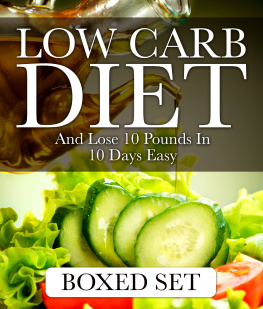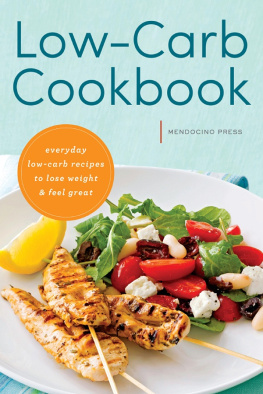spiralizer skinny
LoseWeightwithEasyLow-CarbSpiralizerRecipes
By Vicky Ushakova and Rami Abramov

The author and publisher have provided this e-book to you for your personal use only. You may not make this e-book publicly available in any way.
Copyright infringement is against the law. If you believe the copy of this e-book you are reading infringes on the authors copyright, please notify the publisher at: http://us.macmillanusa.com/piracy.
Before you read any further, you should know that this isnt going to be your typical cookbook. Whats your first thought when you hear the word
diet? Starving yourself? Bland food? Fat-free? Willpower? Something you really dont want to do? This is a book about dieting, but not the kind youre probably thinking about.
We embrace a diet in which you thrive, not one in which you starve, cut out anything with a gram of fat, lose a little weight and in a short period of time only to gain it all back. Lifes too short to choose a boring, unhealthy and ineffective diet. This is a book about how to feel and look great by eating delicious food without cutting or counting calories. Youll be benefiting your health, both mental and physical. To make everything even better, we swapped in spiralized veggies. Why? No more weighing the pros and cons before meals or hesitating before reaching for second helpings.
Youll find better flavors and freshness with every meal, and more nutrients and vitamins in every dishthe list of benefits goes on. These unique recipes wouldnt be possible without spiralizing. Just three years ago, we thought it sounded too good to be true, too. Today, millions of our blog followers eat the same way we do and are happier than theyve ever been about themselves. Thats because they already know what youre about to find out.
DIETYMOLOGY
When it comes to eating, the word diet has two meanings that are commonly used interchangeably.
The original definition of diet means a way of life, or in todays terms, the kinds of foods a person regularly consumes. The second, more recent definition means restricting foods and watching what you eat to reduce your weight. Due to celebrities influence, mainstream media and this newer, popularized definition of dieting, the whole word now carries a sort of stigma. Everyone dreads starting a diet again after failing for the tenth time, right? Therein lies the problem. The original way of life meaning has a negative connotation when it should be quite the opposite. Going on a 30-day purge or other fad diet will only temporarily fix a permanent problem.
To follow a diet for life, you must choose one that is sustainable and enjoyable. With our book Spiralizer Skinny, youll find inventive ways to transform the hassle of dieting into an adventure of delicious foods and satisfying results. What was once a burden will become second nature, and meeting all your goals (and more!) will happen with enjoyment and satisfaction.
1
A DIET BASED ON SCIENCE
In recent years, there has been mounting research on the health benefits of reducing dietary carbohydrates and increasing healthy fats. Additionally, an increasing number of studies are showing that a decrease in carbohydrate intake is strongly related to decreases in both type 2 diabetes and coronary heart disease (CHD). This type of diet is called a low-carbohydrate, or low-carb, diet.
Low-carb diets are also commonly called ketogenic, or keto, diets, because when you eat fewer than 50 grams of carbohydrates per day, your body enters ketosis. Ketosis is the metabolic state in which your body primarily uses ketones (taken from dietary fat) as a source of energy instead of glucose (taken from carbs). So when you cut carbs and eat more fat, your body will start to use fat (dietary fat and stored body fat) as its main source of energy. On a low-carb diet, you get most of your energy from fats. The few carbs you do eat come from wholesome sources like vegetables, nuts and small amounts of fruit. When eating low carb, 70 to 75 percent of the calories should come from fat, 20 to 25 percent from protein and about 5 percent from carbohydrates.
The low-carb diet has been around for a long time, although it has taken on different names and forms. You might have heard of some of these names before: Atkins Diet. This is a multiphase, low-carb diet, popularized by Robert Atkins in the late 1900s. The first two phases are very low carb. LCHF Diet. LCHF stands for low carb, high fat. Its another name for the low-carb diet. Ketogenic/Ketosis/Ketone/Keto Diet. This diet falls under the low-carb, high-fat diet but is considered stricter due to its maximum consumption of 25 grams of carbs per day to guarantee the dieter enters ketosis.
The goal is to get the body to use ketones for energy and burn the most fat. Most long-term, low-carb dieters can eat up to 50 grams of carbs a day (or even more) and still maintain ketosis. Banting Diet. This diet is named after William Banting, who in 1863 wrote a booklet containing a plan for a diet that avoided most carbs. He is known for being the first to popularize a low-carb diet. When you cut carbs and eat more fat, your body will use fat as its main source of energy.
WHY EAT LOW CARB?
Todays Standard American Diet (SAD) is anything but low carb.
In fact, starting in the late 1970s, when the low-fat dogma began, so did the rise of obesity, which quickly grew to an epidemic. Diabetes and heart disease skyrocketed as soon as we began increasing our carbohydrate intake, reducing our fat intake and eating chemical-laden foods. Reducing carbohydrates and opting for a more natural diet, full of fats, protein and fiber, has many health benefits, both immediate and long term. Studies consistently show that people who eat a low-carb, high-fat diet instead of a high-carb, low-fat diet: Lose more weight and body fat Have increased levels of good cholesterol Show reduced blood sugar and insulin levels Experience a decrease in appetite, with less snacking and overeating Have consistent energy levels throughout the day In addition, eating low carb long term has been proven to: Reduce blood sugar levels, because there are no carbohydrates to break down into blood glucose Reduce insulin resistance and levels, commonly reversing and eventually ending type 2 diabetes Reduce triglycerides (fat molecules in the blood that cause heart disease) Increase levels of HDL and large LDL (the good kind of cholesterol) and reduce levels of small LDL (the bad kind) Significantly reduce blood pressure, leading to reduction in heart disease and stroke Improve brain function, because the brain runs primarily and more efficiently on ketones rather than on glucose
FOLLOW THE SCIENCE
Carbohydrates and Fats
Carbohydrates: The Sugar Molecules
Carbohydrates, sugars found in food, break down in your body to create glucose. Each gram of carbohydrate eaten provides 4 calories of energy. Carbohydrate-rich foods include grains and starchy foods like wheat, flour, corn, rice, potatoes, sugar, fruits, beans and lentils.













 The author and publisher have provided this e-book to you for your personal use only. You may not make this e-book publicly available in any way. Copyright infringement is against the law. If you believe the copy of this e-book you are reading infringes on the authors copyright, please notify the publisher at: http://us.macmillanusa.com/piracy. Before you read any further, you should know that this isnt going to be your typical cookbook. Whats your first thought when you hear the word diet? Starving yourself? Bland food? Fat-free? Willpower? Something you really dont want to do? This is a book about dieting, but not the kind youre probably thinking about.
The author and publisher have provided this e-book to you for your personal use only. You may not make this e-book publicly available in any way. Copyright infringement is against the law. If you believe the copy of this e-book you are reading infringes on the authors copyright, please notify the publisher at: http://us.macmillanusa.com/piracy. Before you read any further, you should know that this isnt going to be your typical cookbook. Whats your first thought when you hear the word diet? Starving yourself? Bland food? Fat-free? Willpower? Something you really dont want to do? This is a book about dieting, but not the kind youre probably thinking about. 